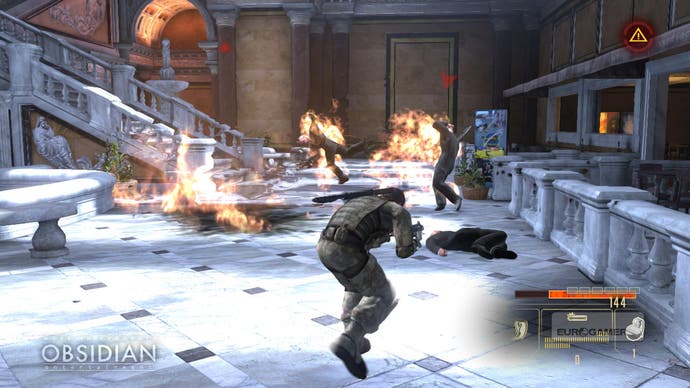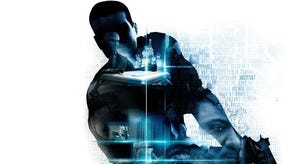Alpha Protocol
License to skill-points.
A few minutes of footage is always unlikely to be representative of a role-playing game, because in a few minutes of videogame footage, in the face of lots of game-hungry industry folks, it's vital to show several things, those things being: guns, guns being fired at someone, someone falling over when fired at with guns. Given that RPGs are as much about dialogue and narrative as they are about action, this approach is rather like promoting an album by stitching together all the choruses. Sure, it's noisy and excited, but it's also confusing and peculiar. For the same reason, E3 didn't do Alpha Protocol many favours.
Guns, guns, guns. The wrong end of the stick, it seems. Sure, this is a game about secret agents in the near future, but it's being made by Obsidian - they of Neverwinter Nights 2 and Knights of the Old Republic 2. Regardless of those RPGs' many embarrassing technical problems - something Obsidian is resolute won't happen with Alpha Protocol - what they definitely did well was story. Arguably, even better than the BioWare games they were sequels to. In a lengthy walkthrough of what Obsidian call 'reactivity' in Alpha Protocol, I get a decent sense of how your character's actions - as opposed to his action - influence the game in both the short and long term. And all without some all-knowing morality meter judging you for choices.
Say you want to be a nice guy: the Sean Connery model. Super. Drunken geriatric informant Grigori is appreciative of your kindness to him, offering up details of a side-mission as well as the information you need, and, seeing as you're now chums, offering you some fancy armour to protect yourself. Off you go to your mission, feeling all warm and fuzzy, and, after killing or stealthing past a few mooks, you encounter Sei. She's a Teutonic warrior-woman, buff as you like and with an accent you wouldn't laugh at to her face - think Dolph Lundgren in a crop top. So you turn on the charm and... you get rebuffed, possibly even attacked. Sei's not interested in politeness. She wants aggression and arrogance. You could even opt to fight her, and that'll impress her even more. Later, we're promised a catfight between her and your agency guide.

Or perhaps you don't want to be a nice guy. Perhaps you want to be a brutal meathead: the Daniel Craig model. Super. Drunken geriatric informatant Grigori peels his face off the table you've just smashed it into and grudgingly shares the location of your target. He doesn't offer any further information, but he's so terrified of you that he does let you access his gun collection. Off you go to your mission, feeling pumped with rage and confidence, and, after killing or stealthing past a few mooks, you encounter Sei. She takes your threats, mockery and absurd self-confidence as something like flirtation and offers to lend you a hand (or, specifically, the gun-toting hands of several dozen of her hired mercenaries). And you'll probably need it, seeing as battered old Grigori sold you out and let your target know you're coming.
Adaptation to your play-style, not punishment. In fact, Alpha Protocol could even be said to be rewarding you for playing however you like. While clearly this is only one example, if Obsidian can stretch this philosophy across all 30-odd hours of the game (which sounds short for an RPG, but the 120 hours of dialogue hint at huge scope for replay) it could achieve something role-playing developers have been chasing in vain for years: a game that's truly shaped by you, not one that simply tumbles into arbitrary good, bad, and somewhere-in-the-middle.









